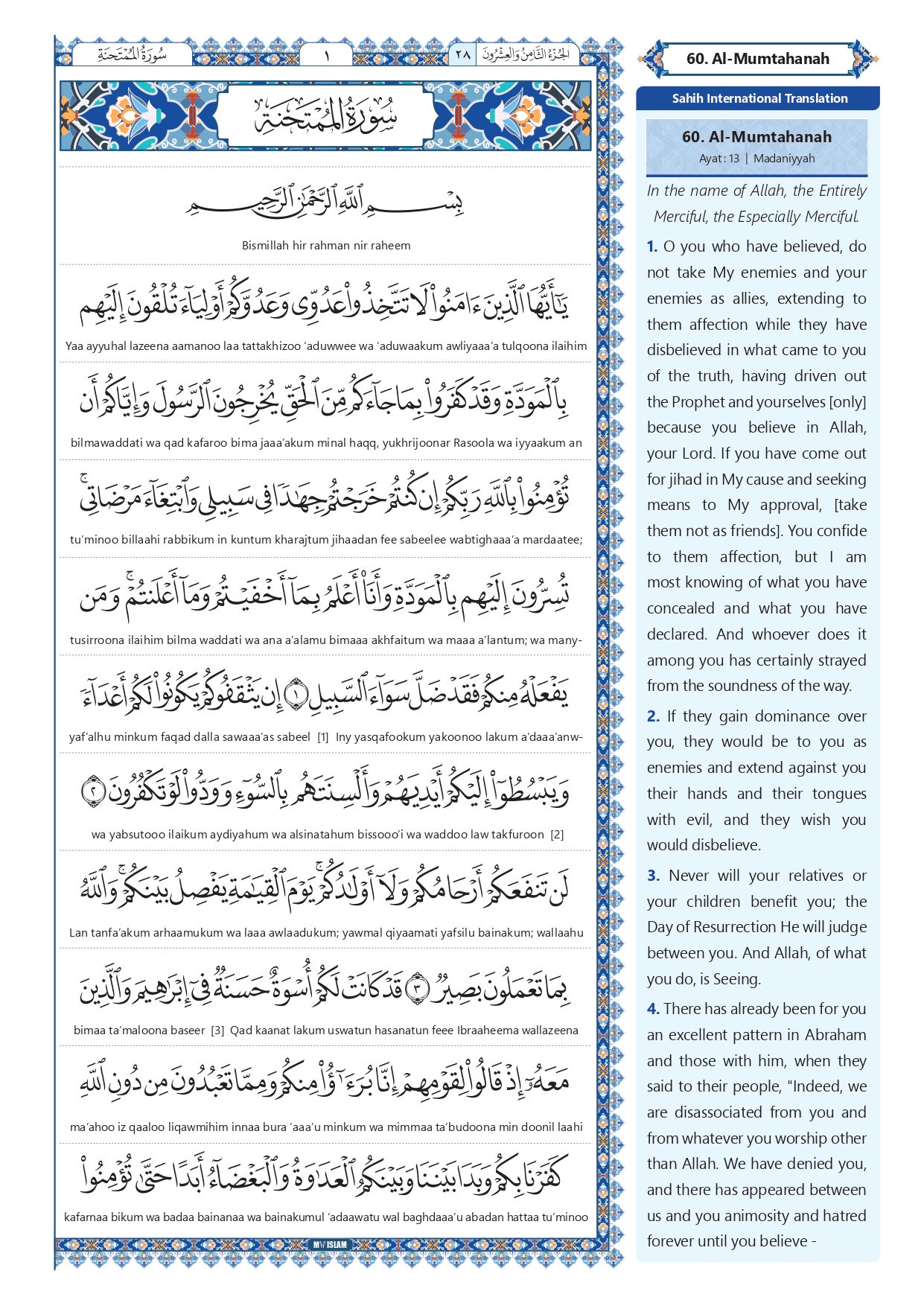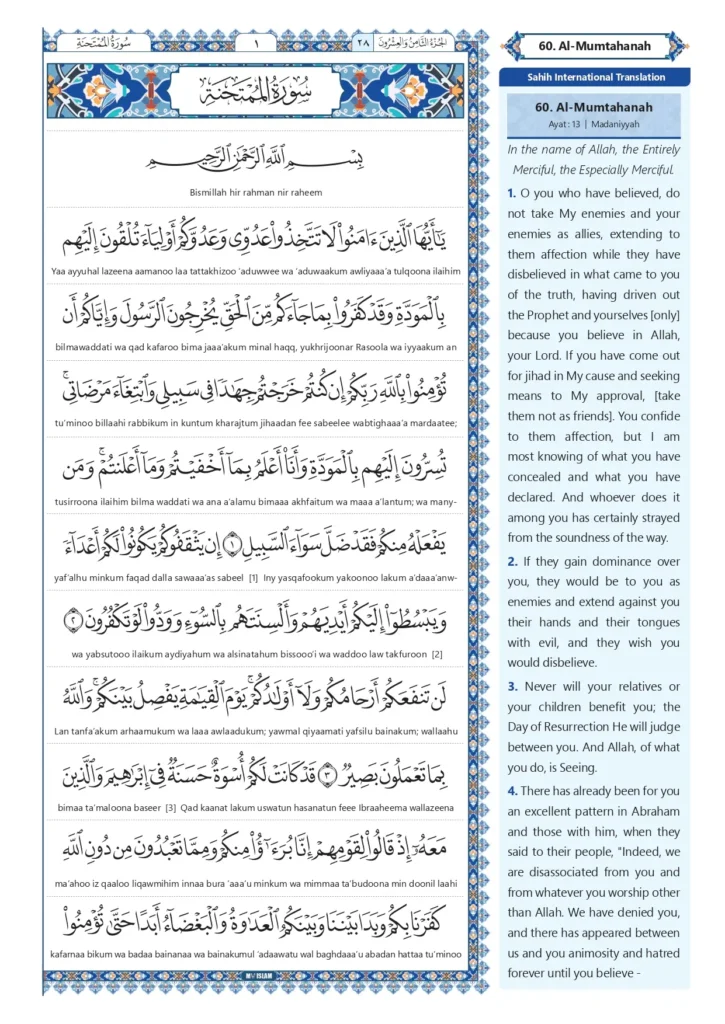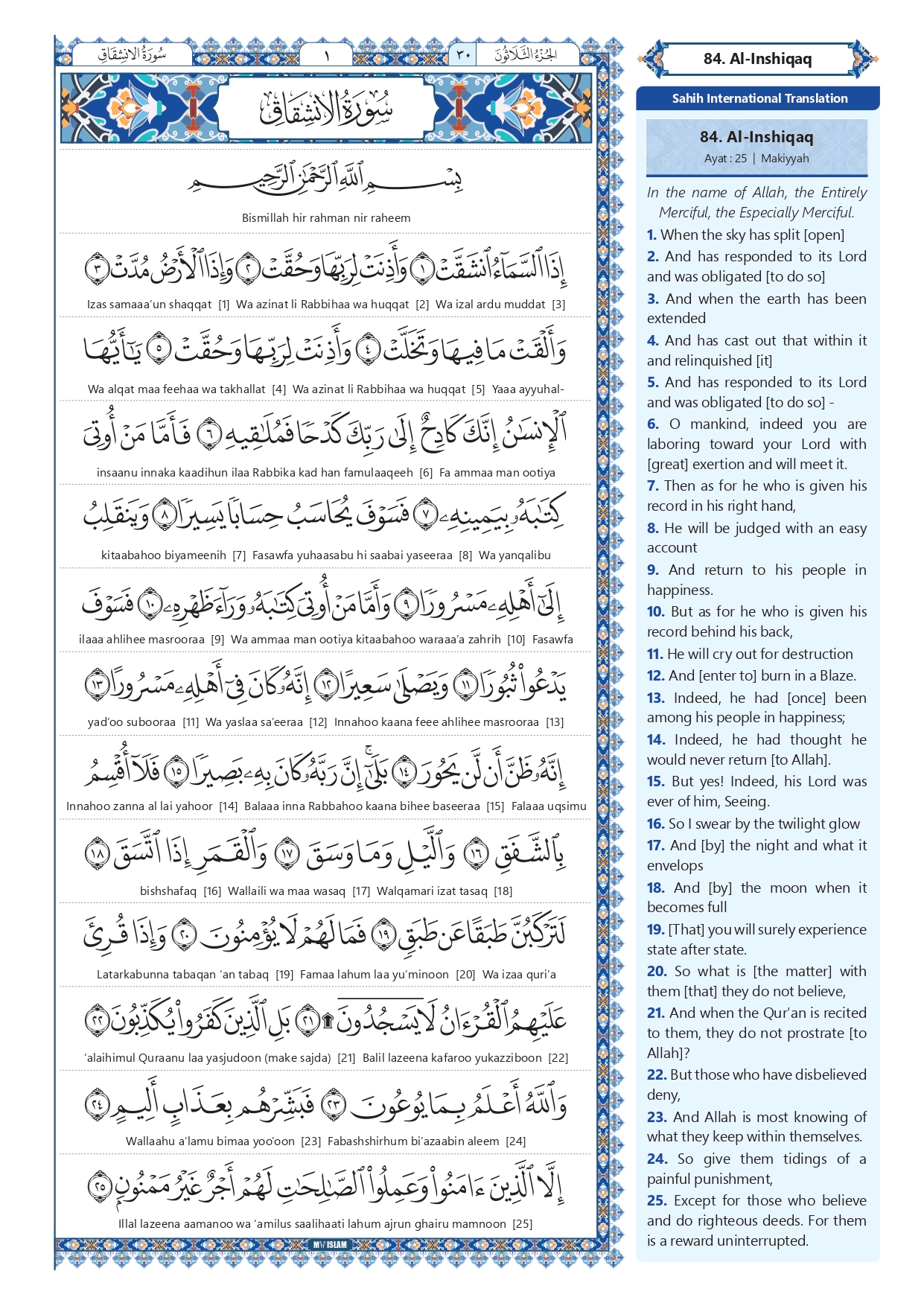Surah Al Mumtahanah in English Transliteration, also known as “The Woman to be Examined,” is the 60th chapter of the Holy Qur’an. This Surah holds a significant place in Islamic teachings as it provides guidance on relationships between believers and non-believers and emphasizes the importance of maintaining one’s faith while interacting with others, especially during times of conflict and social challenges.
What is Surah Al Mumtahanah in English Transliteration?
Surah Al-Mumtahanah was revealed in the later period of Prophet Muhammad’s mission in Medina. The Surah consists of 13 verses and addresses the trials and situations faced by early Muslims regarding their relationships with non-believers, especially when conflicts of faith and loyalty arise. The chapter guides how to handle these sensitive matters with wisdom, compassion, and adherence to the principles of Islam.
Surah Al-Mumtahanah:
Surah Al-Mumtahanah teaches loyalty, sincerity, and love for Allah’s path.
Let it help you refine your intentions.

Keep Arabic-OM.com in your heart and your browser as your faithful companion.
Full English Transliteration of Surah Al-Mumtahanah



Surah Al Mumtahanah in English Transliteration
A’uthu billahi min ash-shaytan ir-rajim
Bismillahir Rahmanir Raheem
- Yaa ayyuhal-ladheena aamanoo laa tattakhidhoo ‘aduwwee wa ‘aduwwakum awliyaa’ tulqoona ilayhim bil-mawaddati wa qad kafaroo bimaa jaa’akum minal haqqi yukhrijoona arrasoola wa iyyaakum an tu’minoo billaahi rabbikum; in kuntum kharajtum jihaadan fee sabeelee wabtighaaa’a mardatee tusirroona ilayhim bil-mawaddati wa ana a’lamu bimaa akfaitum wa maa a’lantum; wa mai yaf’alhu minkum faqad dalla sawaa’ as-sabeel
- In yathqafuukum yakoonoo lakum a’daa’an wa yabsutooo ilaykum aydeehum wa alsinatahum bis-soo’i wa waddoo law takfuroon
- Lan tanfa’akum arhaamukum wa laa awlaadukum yawmal qiyaamati yafsilu baynakum; wa Allahu bimaa ta’maloona baseer
- Qad kaanat lakum uswatun hasanatun fee Ibraaheema wal-ladheena ma’ahu idh qaaloo li qawmihim innaa buraaa’aa’u minkum wa mimmaa ta’budoona min doonil-laahi kafarnaa bikum wa badaa baynanaa wa baynakum ul’adawatu wal-baghdaa’u abadan hattaa tu’minoo billaahi wahdah; illaa qawla Ibraaheema li abeehi la astaghfiranna laka wa maa amliku laka min allaahi min shay’; rabbanaa ‘alayka tawakkalnaa wa ilayka anabnaa wa ilaykal-maseer
- Rabbanaa laa taj’alnaa fitnatan lilladheena kafaroo waghfir lanaa rabbanaa innaka antal-‘azeezu al-hakeem
- Laqad kaana lakum feehim uswatun hasanatun liman kaana yarjoo Allaaha wal-yawm al-aakhir; wa man yatawalla fa inna Allaha huwa al-ghaniyyu al-hameed
- ‘Asaa Allaahu an yaj’ala baynakum wa bayna al-ladheena ‘aadaytum minhum mawaddatan; wa Allaahu qadeerun wa Allaahu ghafoorun raheem
- Laa yanhaakumu Allaahu ‘anil-ladheena lam yuqaatilookum fid-deeni wa lam yukhrijookum min diyaarikum an tabarroohum wa tuqsitoo ilayhim; inna Allaaha yuhibbul-muqsitoon
- Innamaa yanhaakumu Allaahu ‘anil-ladheena qaatalookum fid-deeni wa akhrajookum min diyaarikum wa dhaaharoo ‘alaa ikhraajikum an tawallawhum; wa man yatawallahum fa ulaa’ika humuz-dhalimoon
- Yaa ayyuhal-ladheena aamanoo idhaa jaa’akum ul-mu’minaatu muhaajiraatin faamtahinoohunna; Allaahu a’lamu bi eemaanihinna; fa in ‘alimtumoo hunnna mu’minaatin fa laa tarji’oohunna ilal-kuffaar; laa hunna hillul lahum wa laa hum yahilloona lahunna wa aatoohum maa anfaqoo; wa laa junaaha ‘alaykum an tankihoohunna ithaa aataitumuhunna ujoorahunna; wa laa tumsikoo bi’isaqil-kawaafir wa as’ aloo maa anfaqutum wa liyas’aloo maa anfaqoo; dhaalikim hukmullahi yahkumu baynakum; wa Allaahu ‘aleemun hakeem
- Wa in faatakaum shay’um min azwaajikum ilal-kuffaari fa aaqabtum fa aatoo al-ladheena dhahabat azwaajuhum mithla maa anfaqoo; wattaqoo Allaaha allathee antum bihee mu’minoon
- Yaa ayyuhannabiyyu idhaa jaa’akal mu’minaatu yubayi’naka ‘alaa alla yushrikna billaahi shay’an wa laa yasriqna wa laa yazneena wa laa yaqtulna awlaadahunna wa laa ya’teena bi buhtaanin yaftareenahu bayna aydeehinna wa arjulihinna wa laa ya’seenaka fee ma’roofin fa baayi’hunna wastaghfir lahunna Allaaha; inna Allaaha ghafoorun raheem
- Yaa ayyuhal-ladheena aamanoo laa tatawallaw qawman ghadiba Allaahu ‘alayhim qad yasihoo minal aakhirati kamaa yasihi al-kuffaari min as-haabil quboor
English Translation:
- O you who have believed, do not take My enemies and your enemies as allies, extending to them affection while they have disbelieved in what came to you of the truth, having driven out the Messenger and yourselves because you believe in Allah, your Lord. If you have come out for jihad in My cause and seeking My approval, you show them affection in secret, but I am most knowing of what you have concealed and what you have declared. And whoever does it among you has certainly strayed from the soundness of the way.
- If they gain dominance over you, they would be to you as enemies and extend against you their hands and their tongues with evil, and they wish you would disbelieve.
- Never will your relatives or your children benefit you; the Day of Resurrection He will judge between you. And Allah, of what you do, is Seeing.
- There has already been for you an excellent example in Abraham and those with him, when they said to their people, “Indeed, we are disassociated from you and from whatever you worship other than Allah. We have denied you, and there has appeared between us and you animosity and hatred forever until you believe in Allah alone” – except for the saying of Abraham to his father, “I will surely ask forgiveness for you, but I have not [power to do] for you anything against Allah. Our Lord, upon You we have relied, and to You we have returned, and to You is the destination.
- Our Lord, make us not a [trial] for the disbelievers and forgive us, our Lord. Indeed, it is You who is the Exalted in Might, the Wise.”
- There has certainly been for you in them an excellent example for anyone whose hope is in Allah and the Last Day. And whoever turns away – then indeed, Allah is the Free of need, the Praiseworthy.
- Perhaps Allah will put, between you and those to whom you have been enemies among them, affection. And Allah is competent, and Allah is Forgiving and Merciful.
- Allah does not forbid you from those who do not fight you because of religion and do not expel you from your homes – from being righteous toward them and acting justly toward them. Indeed, Allah loves those who act justly.
- Allah only forbids you from those who fight you because of religion and expel you from your homes and aid in your expulsion – [forbids] that you make allies of them. And whoever makes allies of them, then it is those who are the wrongdoers.
- O you who have believed, when the believing women come to you as emigrants, examine them. Allah is most knowing as to their faith. And if you know them to be believers, then do not return them to the disbelievers; they are not lawful [wives] for them, nor are they lawful [husbands] for them. But give the disbelievers what they have spent [in dowry]. And there is no blame upon you if you marry them when you have given them their due compensation. And hold not to marriage bonds with disbelieving women, but ask for what you have spent and let them ask for what they have spent. That is the judgment of Allah; He judges between you. And Allah is Knowing and Wise.
- And if you have lost any of your wives to the disbelievers and you subsequently obtain [something], then give those whose wives have gone the equivalent of what they had spent. And fear Allah, in whom you are believers.
- O Prophet, when the believing women come to you pledging to you that they will not associate anything with Allah, nor will they steal, nor will they commit unlawful sexual intercourse, nor will they kill their children, nor will they bring forth a slander they have invented between their arms and legs, nor will they disobey you in what is right – then accept their pledge and ask forgiveness for them of Allah. Indeed, Allah is Forgiving and Merciful.
- O you who have believed, do not make allies of a people with whom Allah has become angry. They have despaired of the Hereafter just as the disbelievers have despaired of the inhabitants of the graves.
The Importance of Surah Al Mumtahanah in English Transliteration
This Surah emphasizes the need to balance compassion with a firm commitment to faith. It addresses how Muslims should interact with non-believers and outlines principles for maintaining loyalty to the community while practicing kindness and wisdom.
How to Memorize Surah Al Mumtahanah in English Transliteration
Memorization Techniques:
- Section by Section: Divide the Surah into smaller parts and memorize each section thoroughly before moving on.
- Daily Practice: Repetition is key. Recite the verses multiple times throughout the day.
- Engage with the Meaning: Understanding the context and meaning of the verses can help in memorizing them more effectively.
How to Recite Surah Al Mumtahanah in English Transliteration
Recitation Tips:
- Correct Pronunciation: Ensure that you are practicing the rules of Tajweed to recite the Surah beautifully and correctly.
- Use Audio Aids: Listen to well-known Qaris to perfect your recitation and understand the rhythm.
- Video Tutorials: Utilize resources like our upcoming video, which will provide a step-by-step guide on how to recite Surah Al-Mumtahanah.
Benefits of Surah Al Mumtahanah in English Transliteration
- Guidance on Social Conduct: The Surah provides insight into managing relationships with non-believers, particularly in times of conflict, without compromising on faith.
- Strengthens Faith: It emphasizes the importance of loyalty and the significance of making decisions based on one’s beliefs.
- Teaches Compassion: Even in addressing matters of conflict, the Surah encourages kindness and fairness.
Learn the Qur’an with Us for Free
We offer comprehensive resources to help you learn and understand the Qur’an at no cost. Our platform provides transliterations, translations, and detailed explanations, making the process accessible for non-Arabic speakers. You can also benefit from video tutorials that teach correct recitation techniques.
surah saff in english Transliteration Read Surah saff online 63
Frequently Asked Questions (FAQ) Surah Al Mumtahanah in English Transliteration
- What is the main message of Surah Al Mumtahanah in English Transliteration?
The Surah Al Mumtahanah in English Transliteration teaches how to manage relationships with non-believers, emphasizing loyalty to faith while promoting fairness and compassion. - How many verses does Surah Al Mumtahanah in English Transliteration have?
It consists of 13 verses. - Why is Surah Al-Mumtahanah called “The Woman to be Examined”?
The name comes from the directive to examine believing women who migrated to Medina to ensure their sincerity in faith. - Can I memorize Surah Al-Mumtahanah easily?
Yes, by breaking the Surah into smaller parts and practicing regularly, you can memorize it efficiently. - What are the benefits of reciting Surah Al Mumtahanah in English Transliteration?
Reciting this Surah can help you understand the importance of balancing compassion and loyalty to your faith. - How should I recite Surah Al-Mumtahanah correctly?
Follow the rules of Tajweed and listen to reputable reciters for guidance on pronunciation. - Is there a specific time to recite Surah Al Mumtahanah in English Transliteration?
There is no specific time, but it can be recited during prayers or as part of daily Quranic reading. - What themes are covered in Surah Al Mumtahanah in English Transliteration?
The Surah Al Mumtahanah in English Transliteration covers themes like loyalty, compassion, and guidance on interacting with non-believers. - How does this Surah address conflict resolution?
It provides guidelines on maintaining faith while dealing fairly and kindly with adversaries. - Where can I learn more about the meanings of Surah Al Mumtahanah in English Transliteration?
You can access our free resources, including explanations, transliterations, and audio guides, on our platform.



